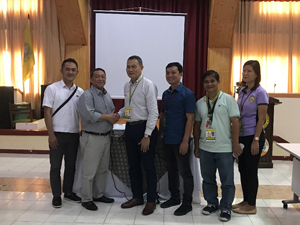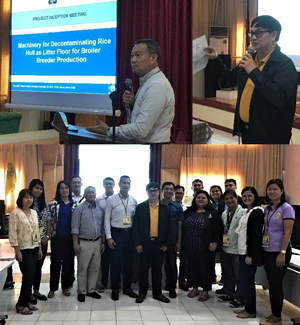 Central Luzon State University (CLSU) and Cobb-Vantress Philippines Incorporated collaborate on a project to develop “Machinery for Decontaminating Rice Hull as Litter Floor for Broiler Breeder Production.”
Central Luzon State University (CLSU) and Cobb-Vantress Philippines Incorporated collaborate on a project to develop “Machinery for Decontaminating Rice Hull as Litter Floor for Broiler Breeder Production.”
This project is funded through the Collaborative Research and Development to Leverage Philippines Economy (CRADLE) Program of the Department of Science and Technology (DOST).
CRADLE is one of the components of the DOST’s Science for Change Program, which aims to create a synergistic relationship between the academe and industry in terms of research and development (R&D). The industry identifies the problem that needs solution and the academe conducts the necessary R&D to solve the problem.
During the project inception meeting organized by DOST’s Philippine Council for Agriculture, Aquatic and Natural Resources Research and Development (DOST-PCAARRD), project leader Dr. Marvin M. Cinense presented Cobb Vantress and CLSU’s joint effort in packaging the project.
 As a supplier of breeding stock for major integrators in the Philippines, Cobb-Vantress targets to produce 2.0 million parent stock every year. To attain this target, it needs enormous amounts of rice hulls as litter material for chickens in scratching and mating area.
As a supplier of breeding stock for major integrators in the Philippines, Cobb-Vantress targets to produce 2.0 million parent stock every year. To attain this target, it needs enormous amounts of rice hulls as litter material for chickens in scratching and mating area.
The company needs 3,500 to 4,000 bags/month at 10-12 kilogram per bag. During rainy season, supply of these materials is inadequate, leaving them the option to store the materials while supply is high. However, the stored materials encounter contamination issues. The contamination of litter materials may lead to poor performance and health risk to their stocks.
In response to this problem, CLSU’s project will design and fabricate a decontaminating machine with four parts: rice hull cleaner, decontaminating/mixing machine, dryer, and bagger. The research team will evaluate machinery’s performance and the litter materials after decontamination.
PCAARRD through its Agricultural Resources Management Research Division (ARMRD) will monitor and evaluate the implementation of the project. ARMRD Director, Dr. Juanito T. Batalon, expressed hopes that this two-year project will answer the problems and needs of the industry.
